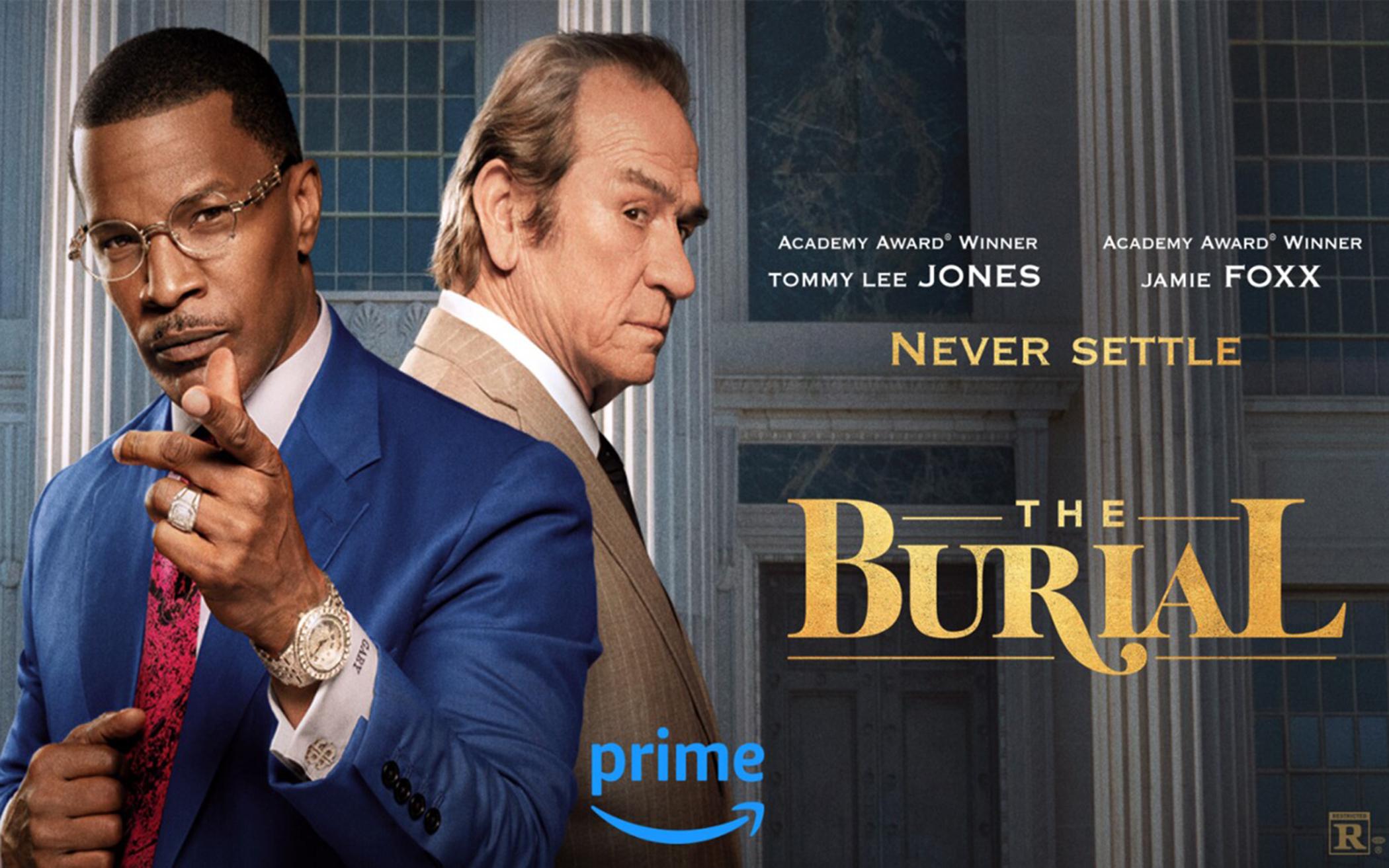My family and I watched this rollicking courtroom drama pretty much all the way through with our jaws dropped open, for reasons I will reveal at the end of this review. Based on a real-life David-and-Goliath courtroom brawl circa 1995, The Burial explores themes of justice as it pertains to rich versus poor, Black versus white, and privileged versus disenfranchised.
There’s much to chew on in this movie (and surrounding this movie, see below), which makes it a thought-provoking viewing experience. Provocative, yes, and also quite entertaining. Jamie Foxx’s performance, as super lawyer Willie E. Gary, exudes a bouncy magnetism, crackling wit, and, somehow, soulful vulnerability and spirituality. Foxx was born to play Willie Gary, that much is clear. He and the much quieter Tommy Lee Jones, playing the humble funeral home director Jeremiah O’ Keefe, spark off of each other all the way through this film, giving it the congenial feel of a buddy movie.
The setup: Having made a bad financial decision that puts his funeral home business in jeopardy (and more worrying, his family’s future), O’ Keefe reluctantly decides to fly to Canada and accept an offer from a mega-rich deathcare magnate named Ray Loewen (an under-utilized Bill Camp). The deal is that Loewen will buy three of his funeral homes in Mississippi and thereby resolve his financial issues and secure the futures of his 13 children and their offspring.
O’Keefe made this deal in good faith, as uncomfortable as he was being wined and dined on Loewen’s $22 million yacht. But his young, inexperienced lawyer, Hal Dockins (a winsome Mamoudou Athie), is convinced that Loewen never actually signed the papers and is waiting for O’Keefe to go bankrupt so he can scoop up his business for pennies on the dollar. Dockins convinces his client to sue, something the decent and salt-of-the-earth O’Keefe has never done and never thought of doing in his 75 years. But for his family’s sake, he decides to go through with it, and on Dockins’ advice, hires the flashy, brash and fearless Willie Gary as his lead counsel.
Based on a New Yorker article from 1999, The Burial seems to be your basic courtroom drama ala something John Grisham would have written in the 1990s. But as the layers of this onion are peeled back, it becomes evident that the corruption by Loewen is even worse than we think at first. Not only are he and his company trying to bilk the small business owner O’ Keefe of his life’s work, but they also slyly engage people from one of the biggest Black denominations in the U.S. into acting as their agents, gouging their own people under the guise of church affinity. Because the Loewen group held a monopoly on funeral homes and services in that Mississippi area, they could and would double and triple charge people for coffins and burial insurance. Their apathy and calloused detachment to the poor and grieving they are exploiting is chilling; this becomes a key factor in the case.
Why did I watch this movie with my mouth hung open, cringing all the way through? Loewen is my mother’s maiden name, and Ray Loewen is in fact a relative of my late grandpa, Peter Loewen, a gentle wheat farmer who had much more in common with O’Keefe than his millionaire kin.
The Loewens I know own tractors, not yachts. They are hard-working, unassuming, and peace-loving Mennonites who came to Canada in the 1870s to flee persecution in Ukraine and Russia. Ray Loewen's great-grandparents were pioneers who lived in sod houses, not mansions. Knowing this, I believe the writers of The Burial could have made their bad guy even worse: In real life, this Loewen was also a churchgoer, a graduate of a Bible college with a theology degree, and the descendent of a people who were once exploited and oppressed themselves.
The minor prophets would have had a field day with this guy. I can just see Amos ranting about justice rolling down like a mighty river for Loewen’s victims. Scripture is replete with verses that condemn the oppression of the poor, especially those who profit off their misery. It reminds me of Deuteronomy 15, in which the writer lays out in great detail how the Israelites are to treat the poor among them: “Remember that you were slaves in Egypt and the Lord your God redeemed you. That is why I give you this command today” (vs. 15).
Ray Loewen is a modern-day example of someone who forgot his own past as a “slave in Egypt” and took terrible advantage of the least of these without a second thought. It would be easy to leave it there, as the movie did, and make him the clear-cut villain, wash our hands of him, and walk away. But life on this oh-so-corruptible planet is messier than that, and the hero, Willie Gary, was accused in real life of sexual assault and defrauding multiple people. Not only that, his portrayer, the undeniably appealing Jamie Foxx, has also been accused of sexual assault himself, something that nagged at me even as I was thoroughly charmed by his performance. It’s complicated!
Rated R for strong language (Loewen would never have talked like that in real life, not that this wins him any points), The Burial is a compelling look at justice in its various forms. It’s also a sobering reminder how, as Christians, we are always to look out for the least of these, to act justly, love mercy, and walk humbly with our God, no matter who we are. (Amazon Prime)
About the Author
Lorilee Craker, a native of Winnipeg, Man., lives in Grand Rapids, Mich. The author of 16 books, she is the Mixed Media editor of The Banner. Her latest book is called Eat Like a Heroine: Nourish and Flourish With Bookish Stars From Anne of Green Gables to Zora Neale Hurston.

